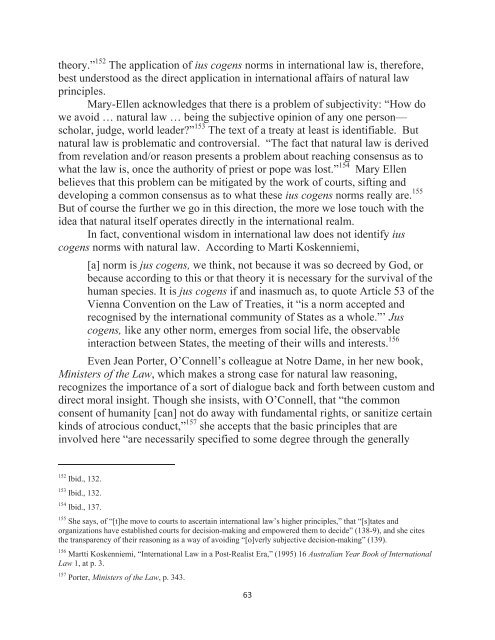International Legal Evangelism: Intelligence, Reconnaissance & Missions
International Legal Evangelism: Intelligence, Reconnaissance & Missions
International Legal Evangelism: Intelligence, Reconnaissance & Missions
Create successful ePaper yourself
Turn your PDF publications into a flip-book with our unique Google optimized e-Paper software.
theory.” 152 The application of ius cogens norms in international law is, therefore,<br />
best understood as the direct application in international affairs of natural law<br />
principles.<br />
Mary-Ellen acknowledges that there is a problem of subjectivity: “How do<br />
we avoid … natural law … being the subjective opinion of any one person—<br />
scholar, judge, world leader?” 153 The text of a treaty at least is identifiable. But<br />
natural law is problematic and controversial. “The fact that natural law is derived<br />
from revelation and/or reason presents a problem about reaching consensus as to<br />
what the law is, once the authority of priest or pope was lost.” 154 Mary Ellen<br />
believes that this problem can be mitigated by the work of courts, sifting and<br />
developing a common consensus as to what these ius cogens norms really are. 155<br />
But of course the further we go in this direction, the more we lose touch with the<br />
idea that natural itself operates directly in the international realm.<br />
In fact, conventional wisdom in international law does not identify ius<br />
cogens norms with natural law. According to Marti Koskenniemi,<br />
[a] norm is jus cogens, we think, not because it was so decreed by God, or<br />
because according to this or that theory it is necessary for the survival of the<br />
human species. It is jus cogens if and inasmuch as, to quote Article 53 of the<br />
Vienna Convention on the Law of Treaties, it “is a norm accepted and<br />
recognised by the international community of States as a whole.”’ Jus<br />
cogens, like any other norm, emerges from social life, the observable<br />
interaction between States, the meeting of their wills and interests. 156<br />
Even Jean Porter, O’Connell’s colleague at Notre Dame, in her new book,<br />
Ministers of the Law, which makes a strong case for natural law reasoning,<br />
recognizes the importance of a sort of dialogue back and forth between custom and<br />
direct moral insight. Though she insists, with O’Connell, that “the common<br />
consent of humanity [can] not do away with fundamental rights, or sanitize certain<br />
kinds of atrocious conduct,” 157 she accepts that the basic principles that are<br />
involved here “are necessarily specified to some degree through the generally<br />
<br />
152 Ibid., 132.<br />
153 Ibid., 132.<br />
154 Ibid., 137.<br />
155 She says, of “[t]he move to courts to ascertain international law’s higher principles,” that “[s]tates and<br />
organizations have established courts for decision-making and empowered them to decide” (138-9), and she cites<br />
the transparency of their reasoning as a way of avoiding “[o]verly subjective decision-making” (139).<br />
156 Martti Koskenniemi, “<strong>International</strong> Law in a Post-Realist Era,” (1995) 16 Australian Year Book of <strong>International</strong><br />
Law 1, at p. 3.<br />
157 Porter, Ministers of the Law, p. 343.<br />
<br />
63

















